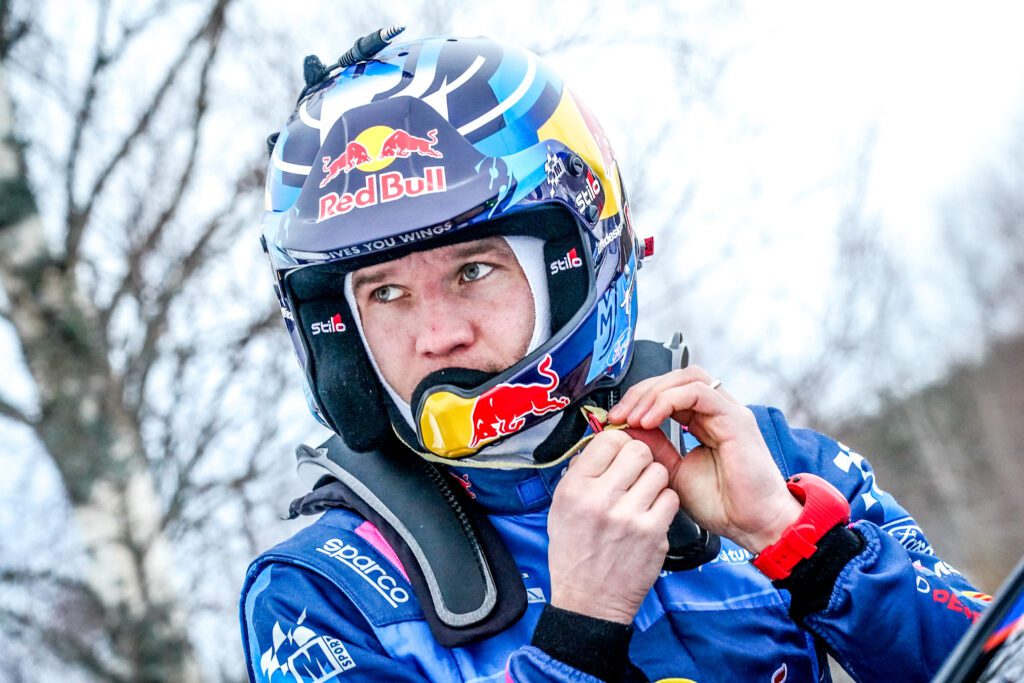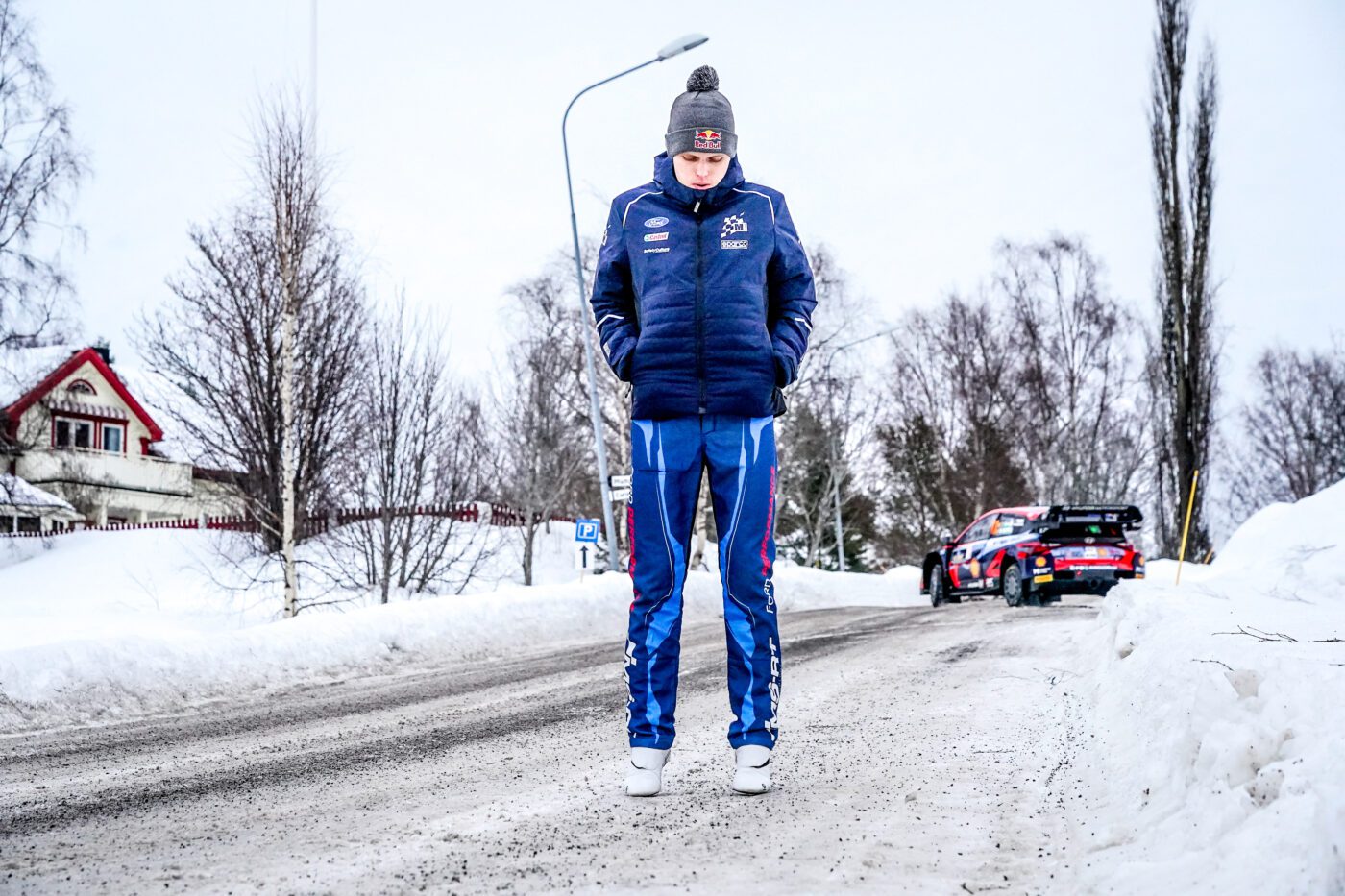The World Rally Championship was in Sweden last weekend for the first time since 2020 for the only true winter rally of the season. The temperatures at night can reach -20; during the day the temperatures can be -7. Many questions can be asked as to how the rally teams cope with the rapid reduction in the temperatures. M-Sport Ford Team Principal Richard Millener told us that when it comes to setting up the service park where they work on the rally cars between stages, the team uses inflatable marques where they can work on the cars. It helps to keep the team personnel warm.
One of the key things for performance really is making sure that everybody is able to work well in what can be difficult conditions. You have to put more effort into ensuring that your team is at the right level and that is not just the drivers, that goes as far as the co-drivers, the mechanics and technicians and everyone as well. The main thing is that we look after the team’s welfare in the freezing temperatures.
Richard Millener
Here is more insight from my interview from Richard Millener.
What do you drink when at the event?
We drink soft drinks, and we also have to remind our guys to drink water because if you drink too much caffeine, you’ll get dehydrated. Hot drinks are important but at the same time you have to try and keep awake to keep going. Rallying are long days as well, so a lot of the guys are fairly switched on in terms of how they look after themselves – multi-vitamin tablets every day to stay healthy. There is a lot of focus that goes on the driver and the crew, but there is a big team behind it ensuring that they work well and make sure that the whole thing works as effectively and efficiently as possible. The physio actually just sent me a review from a company that supplies pillows to try find a way to help you sleep better while you are away. Being in various countries and different hotels, you have a slightly different quality of pillows and different standards of bedding.
Scandinavia tends to have pillows that are almost non-existent and then others prefer great big pillows.
Personally, I find it hard to sleep when it comes to new locations. Anything you can do to help the team not just here but in all locations is important.

Do you use regular cars for the pre-event recce?
There are quite a lot of technical regulations that are firm, made over the course of the season. Things like recce cars and rally cars themselves and basically the regulations are all quite strict. There is not too much deviation across the course of the year. There are just little tweaks here and there, so, even for the recce here you’re not allowed full-studded tires like we have on the rally cars. They are only allowed on for the rally itself due to the damage that you could do to the roads. So, the recce is done on a snowy winter tire. For example, we’ve got a small square door mating that you brush your shoes off as you get inside the rally car so the drivers can get the snow off their shoes. The drivers are wearing very thinly soled shoes. If you are walking around in the snow and then you get snow into a warm rally, car it can create affectively water and that can make things slippery between the pedals and the boot. You don’t want that, so the more powdered snow you can get off before you get into the car the better. We protect the dampers with a material covering to stop the build-up of ice and snow in there. Over the course of the weekend the car will pick up ice around the suspension, but those bits are easy to clean because they are accessible. So, we are trying over the course of the weekend to protect that and also remove that as we go along. So, like I say, it’s more things that are kind of relevant to the snow more than huge great changes in what we do.
Do the drivers wear sunglasses during event stages to protect their eyes from the glare?
This is something that our guys don’t do. It is more of a driver preference thing; some find them useful to find the edges of the road. It tends to be the ones who are not necessarily native to Scandinavia that wear them. You will quite often see some of the drivers wear orange glasses to try and pick out the snow banks. Some of them prefer the yellow, which they tend to wear in low light or if it is snowing to try and stop the glare on reflection. We have options on our lamp pods with different coloured lenses to try and adjust the glare from the lights onto the road as well. So, that kind of concept isn’t just for the human being but it can also be from the car side as well.
Do you find that you lose out on sleep when you return from rally events?
Last year it was key when we had the break in February and March because the calendar was designed around the unknowns of COVID at the time. The second two thirds of the year was incredibly busy, and there were cases of close to burnout. Effectively you were home for ten days to two weeks, really maximum before you’re away onto the next rally again. The rallies are long, really five days for us as a team. Most of them you can expect to be getting up Friday, Saturday and Sunday at least between 5 and 6AM and probably going to bed about between 10 PM and midnight. So, you are doing well if you are getting six plus hours of sleep per night, which would mean you get into the hotel and go straight to bed and wake up. It is impossible.
Monte Carlo this year, I was staying in Monaco, and some of the teams were staying in Nice. On the Thursday night they had three hours sleep, Friday night they had probably four, Saturday night was probably four. That’s a hell of an ask for them and then you get back and realistically it takes you ten days to recover. Then you’re off again and that’s just from the rallies. There are people doing the rallies and testing, plus the other events we are doing. So, these guys and the women are being worked incredibly hard. Personally, I don’t think it’s necessarily correct and that’s why I pushed a lot to get this regulation changed this year where we don’t have morning service. We have a Parc Ferme way out for the gravel events, so you choose the tires the night before, because that means we don’t have to get everybody to come in in the morning. The truth is, it’s impossible to stop having everybody coming in but we can certainly rotate it so some people can come in later than others. The more sleep they get, the more productive they are.
I don’t want to be seen as a guy who doesn’t want to do any work; that is definitely not the case. There’s a balance between working hard and doing things for the sake of doing them, which makes days very long. The event organisers look forward to the WRC every year and I fully appreciate and understand that.
They don’t mind having three or four really long, hard and challenging days, but when you do a full championship, that’s when it starts to get difficult. It is very hard to find personnel at the moment because there is so many flexible, hybrid working type roles available, asking people to come away from their families and do incredibly long days is tough.
Richard Millener has been working with the M-Sport team since 2007 and since 2019 has worked as Team Principal for their World Rally Team. When it comes to the cold temperatures in Sweden, Millener says that team wears Thermal branded clothing to help keep them warm while on each event stage. The Thermal clothing that the team wears include gloves, hats and scarfs.
As Millener mentioned when it comes to snow and icy conditions, the drivers have to be careful with their Sparco flame-proof boot. The lightweight material can get wet, and this can lead to mechanical failures with the cars if water gets into any of the electrical systems. So, before they set off, they need to dry their boots off.
Next up for the World Rally Championship is Rally Mexico, which gets underway on March 16, 2023.
